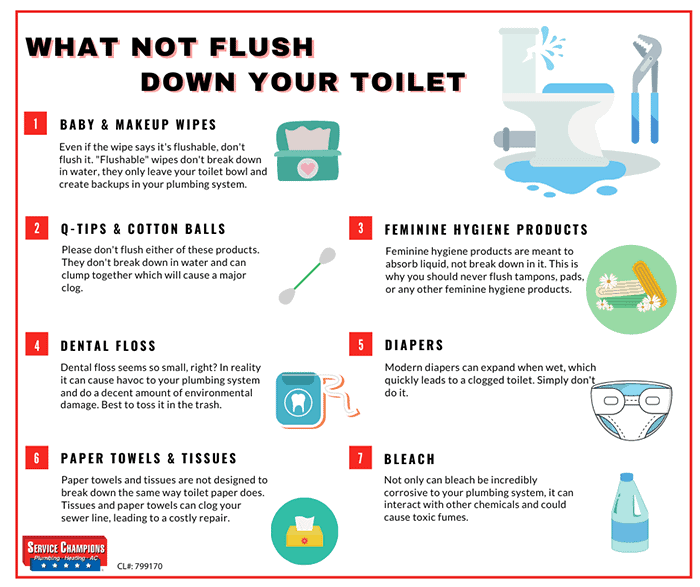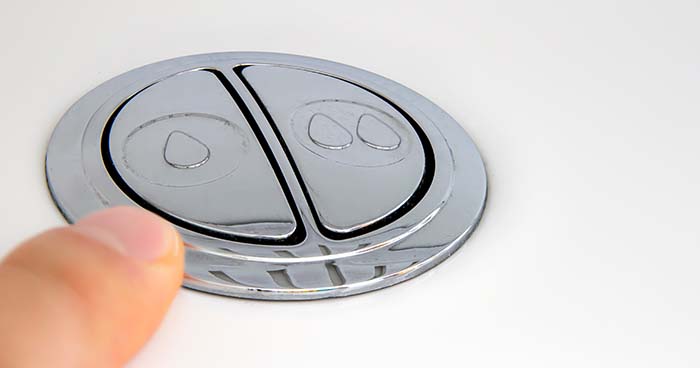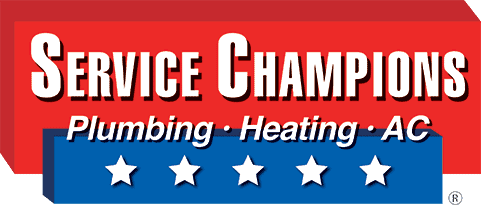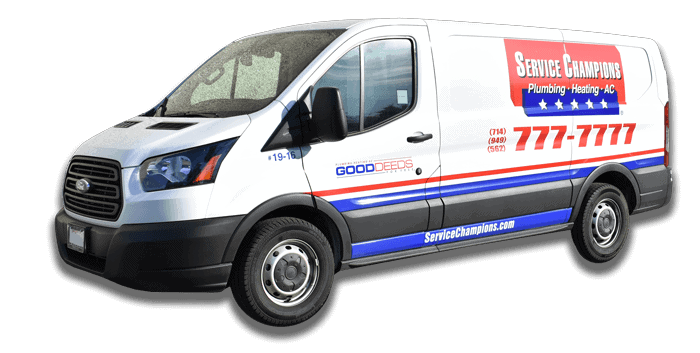Does Your Toilet Always Clog? There’s Something You Can Do About It.
Do you feel like you’re always plunging your toilets? Does your bathroom always seem to be backed up? Are you sick of wasting water on flush after a flush, hoping the next one gets the job done, only to have a mess to clean up afterward? Does your toilet always clog? You’re not alone! And there’s hope!
While Orange County homeowners may take indoor plumbing for granted these days, when it’s not working, we gain a new appreciation for the ease and convenience it provides. It’s a necessity!
Constantly having to plunge after every attempted flush takes too much time and energy. While some toilet clogs can be resolved with a quick plunger job or another DIY fix, when you have a recurring clogging issue, it could be the symptom of a more serious issue in your plumbing system.
These issues may require plumbing maintenance by professional technicians. The Service Champion crew has put together a few questions to help you troubleshoot your frequent toilet clogs.
Are You Flushing Anything Other Than Toilet Tissue?
Toilet tissue is one of only two things that should be flushed down your toilet. The other is human waste. If you or your family have been flushing anything else, this could be why you experience frequent clogs.

- Baby wipes
- Paper towels
- Q-Tips
- Facial wipes or make-up remover
- Feminine napkins or other feminine hygiene products
- Cleaning wipes
- Napkins
Other seemingly flushable products like sweeper pads and wet mop sheets are designed not to break down easily. While this is great for cleaning, it’s terrible for your plumbing.
Is Your Main Sewer Line Damaged?
Your main sewer line connects your home to the underground septic tank or the city sewer system. Should it sustain damage of any kind, you may experience reduced drainage flow and even full obstruction.
Placement for sewer lines is dug out underground and generally safe from natural elements. However, there are still a few threats underground.
Holes also create access for dirt, rocks, and other natural debris to take up residence in your sewer lines. Debris can cause lasting damage, a partial blockage, or even complete obstruction.
A sign that your main pipe is clogged is when all your toilets clog easily. Contact your local plumber and book drain clearing services right away to prevent further damage.
Are You Using Too Much Toilet Paper?
Using too much toilet tissue is a surefire way to clog your toilet, every time. Remember, the more toilet tissue you flush, the more likely your commode is to clog.
A few squares of standard toilet tissue are enough to clean up. A simple change in habits is an easy way to save time unclogging toilets as well as save money on unnecessary amounts of toilet tissue.
NOT THE PRECIOUS TOILET PAPER #quarantinecats pic.twitter.com/vvJnSeYNcK
— Jessi Davin (@jessithebuckeye) March 16, 2020
The denser the tissue, the more difficult it will be to dissolve in your plumbing system. If you buy soft and fluffy toilet tissue, you may experience more frequent clogging.
Talk with your family about economic toilet tissue use and how to avoid creating wads of tissue that are difficult to flush. The next time you’re on the toilet tissue aisle, see what other, more easily flushable options are available to help alleviate clogging.
Is Your S-Trap Clogged?
At the back of every toilet is either an S-shaped or P-shaped pipe that connects the toilet to your plumbing system. This innovative design prevents sewer gasses from escaping the drainpipes and reduces the number of foreign objects that pass through.
Is Your Low-Flow Toilet Underperforming?
It’s true that low-flow toilets use less water and are more environmentally friendly. However, if they do not clear the bowl effectively pushing waste through the S-trap, you may have to flush more times for each use. This will likely result in more water wasted than if you had a standard toilet.

We hope these questions helped you resolve your clogging issues! If not, it may be time to schedule plumbing maintenance.

